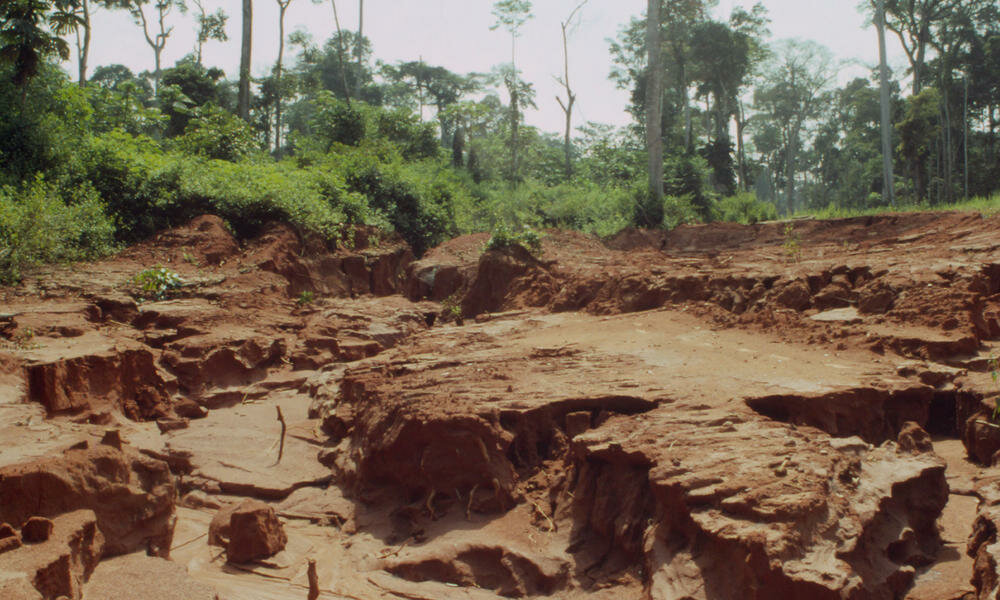2 billion tons of soil erodes annually in Iran: expert

TEHRAN – Iran loses 2 billion tons of soil per year as a result of land use changes, rainfed agriculture, and overgrazing, Hossein Akhani, environmental and botanical expert has announced.
Soil erosion is the displacement of the upper layer of soil, one form of soil degradation, which is caused by the dynamic activity of erosive agents, including, water, ice, snow, wind, plants, animals, and humans. In accordance with these agents, erosion is sometimes divided into water erosion, glacial erosion, snow erosion, wind erosion, zoogenic erosion, and anthropogenic erosion.
Soil erosion may be a slow process that continues relatively unnoticed, or it may occur at an alarming rate causing a serious loss of topsoil. The loss of soil from farmland may be reflected in reduced crop production potential, lower surface water quality, and damaged drainage networks.
“Sometimes, to support agriculture, land use changes permits are issued, while being unaware of its dire consequences on the soil,” he lamented, YJC reported on Saturday.
In a video message released in advance of the World Day to Combat Desertification and Drought, marked on June 17, UN Secretary-General António Guterres warned that the world loses 24 billion tons of fertile land every year, and that the degradation in land quality is responsible for a reduction in the national domestic product of up to eight percent every year.
“Iran is responsible for the loss of 10 percent of the world's total soil erosion per year due to unsustainable agriculture, overgrazing, destruction of natural reservoirs (interconnected sources of water supply such as rivers crossing the mountains),” he said, regretting, humans with uncontrolled interference, such as damping numerous wells have led to the collapse of these connections and prevented water from reaching some regions of the country.
He went on to explain that when water does not reach a wetland, the aquifers are not fed, the vegetation disappears and as a result the soil is exposed to erosion.
Insisting on human interference with the environment, he said, “We explored mining operation in all parts of the country and built roads encroaching natural habitats, and used excessive pesticides resulting in contamination of the soil, regardless of the irreparable damages imposing on the environment.”
“When we turn a land to a farming one for a short-term profit, the valuable soil erodes and causes huge loss which is not comprisable with the agricultural cultivation profit.”
He further highlighted that through sustainable development damages caused by rain fed harvest can be compensated.
“Natural resource management, coordination, and training of related organization must be carried out by the governments,” he noted, regretting that the government’s policies are increasingly in conflict with nature.
“Unfortunately, we witnessed the closure of nature schools, so being against nature is the main reason behind environmental degradation,” he concluded.
Hooshang Jazi, head of soil protection unit of the Forests, Range, and Watershed Management Organization said in February that natural resources and soil conservation have been neglected in Iran since recent years, however, some 7 trillion rials (about $166 million) from the National Development Fund has been earmarked in this regard, which is only one third of the needed funding for the implementation of watershed management projects.
Unfortunately, 250 million cubic meters of soil annually enter the country's dams, due to improper watershed management and neglected soil conservation, he added.
This is while, Iran lately has a soil conservation law which was finally approved after 14 years of effort put in by the Department of Environment.
As per the law, any trade or export of soil is prohibited, and industries contributing to soil contamination will be shut down, mining activities are also subject to compliance with environmental regulations.
FB/MG
Leave a Comment